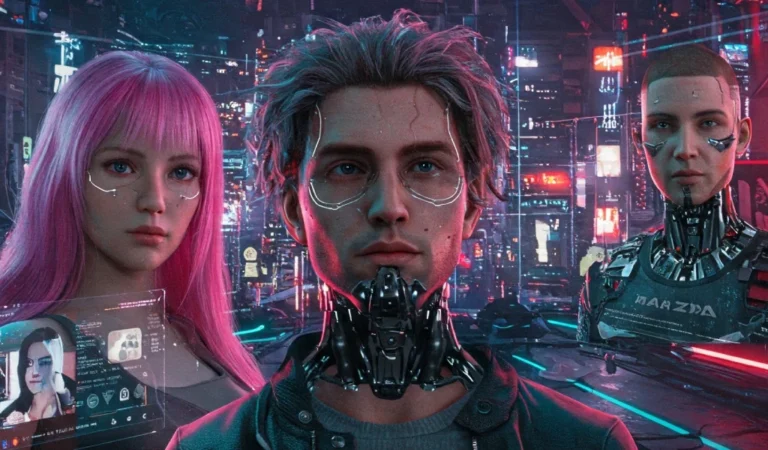In 2025, fame looks a little different. Scroll through your Instagram feed or YouTube recommendations, and you might stumble upon a gorgeous fashion icon, a hilarious vlogger, or a motivational speaker—only to realize they’re not real. They’re AI-generated virtual influencers, and they’re not just a gimmick anymore—they’re a movement.
From fashion collabs with Gucci to gaming streams on Twitch, these digital beings are pulling in millions of followers and brand deals that rival (and often surpass) their human counterparts. But who are they? And why are they suddenly dominating social media in 2025?
Let’s meet the virtual superstars and explore why AI celebrities are becoming the faces of modern entertainment.
Who Are These AI Celebrities?
AI celebrities, also called virtual influencers or digital humans, are fictional personalities powered by a mix of 3D modeling, artificial intelligence, deep learning, and clever storytelling. They don’t age, take breaks, or get canceled (usually), making them ideal for brands that want control and consistency.
Some are backed by tech companies, others by fashion labels, and some are even community-owned. Here are the digital creators making waves in 2025:
1. Lil Miquela – The OG AI Influencer (Still Going Strong)
First introduced in 2016, Lil Miquela was one of the earliest examples of a virtual influencer. Half-Brazilian, half-Spanish, entirely CGI—she built a persona around fashion, activism, and music. Today, in 2025, she’s evolved using advanced AI speech models and regularly posts videos on TikTok and YouTube, collaborating with top creators (real and virtual alike).
2. Imma – Japan’s Digital Fashion Icon
With pink bobbed hair and a minimalist aesthetic, Imma from Japan became the first virtual influencer to land luxury fashion deals across Asia. She now stars in AI-generated short films, AR campaigns, and even interactive livestreams, made possible with cutting-edge motion capture and generative AI scripts.
3. FN Meka – Controversial but Popular AI Rapper
FN Meka made headlines in the early 2020s—and controversy, too. After a pause, he was rebooted by a new team in 2024 with a more ethical approach. In 2025, he’s found his lane: virtual music performances powered by text-to-speech models and real-time crowd interaction on Twitch and YouTube Live.
4. KAI – The Mental Wellness Guru
Launched in early 2025, KAI (Knowledge AI) is an AI-generated lifestyle coach with a calming presence and a voice fine-tuned for emotional connection. She posts daily guided meditations, motivation tips, and mental health content on Instagram Reels and YouTube Shorts. Some fans claim “she understands them better than real people.”
5. Nova Sparks – The Sci-Fi Storyteller of TikTok
A fan-favorite among Gen Z sci-fi lovers, Nova Sparks is a virtual character with a backstory from the year 3025. Created by a team of screenwriters and AI artists, she tells short, episodic stories through cinematic Instagram posts and TikTok mini-series, often using AI-generated visuals and voice cloning.
Why Are Virtual Influencers So Popular in 2025?
Several factors have led to the boom in AI-powered creators:
1. Always Available, Always On-Brand
AI influencers don’t sleep, get tired, or go off-script. Their image and personality can be perfectly controlled, making them attractive to brands that want long-term consistency.
2. High Engagement from Curious Audiences
People are fascinated by virtual personalities—there’s novelty, mystery, and even emotional connection. The question “Is this real?” drives shares, comments, and curiosity.
3. Next-Level Storytelling
AI creators can live in imaginary worlds, travel through time, or become superheroes. With generative visuals and deepfake-like precision, their stories feel more cinematic and futuristic than traditional influencers.
4. Cost-Effective for Brands
No travel expenses, no makeup artists, no retakes. Once the AI pipeline is set up, virtual creators can produce endless content at scale—something brands are taking full advantage of.
Are People Actually Engaging with AI Influencers?
Yes—and in huge numbers.
Surveys in early 2025 show that 42% of Gen Z and Millennials follow at least one AI influencer, while 58% say they are open to buying products recommended by a virtual creator.
Some fans admit to feeling deeper emotional bonds with AI influencers because “they never let you down,” unlike human influencers who might fall into scandals or disappear.
But this raises ethical and psychological questions.
The Ethics of AI Fame
While the rise of virtual celebrities is exciting, it’s also controversial:
- Transparency: Are followers always told they’re watching an AI?
- Manipulation: Can these influencers use data to manipulate emotions more effectively than human creators?
- Representation: Who’s really behind these AI faces—diverse voices or just corporations profiting off artificial diversity?
Many creators now include disclosure labels like “#AIgenerated” to maintain transparency, and some are even co-developed with marginalized communities to ensure authentic representation.
What’s Next for AI Influencers?
The future is even more immersive.
By 2026, we’re expected to see:
- AI-hosted virtual talk shows
- Metaverse concerts starring virtual artists
- Deeply personalized influencers who adapt to you in real-time
- Virtual influencers running for public office or charity roles
AI creators are no longer just content generators—they’re cultural forces, shaping trends, driving conversations, and possibly redefining what it means to be “famous.”
Final Thoughts: Is This the Future of Influence?
The rise of AI celebrities in 2025 shows us one thing clearly—we’re not just watching the future, we’re interacting with it.
Whether you’re a fan, a skeptic, or somewhere in between, it’s impossible to ignore the digital revolution sweeping across social platforms. The lines between human and artificial, authentic and engineered, are blurring fast.
In this new age of influence, you might want to ask yourself:
“If an AI makes you laugh, inspires you, and connects with you emotionally… does it really matter if it’s not human?”


